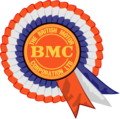History
BMH was established in 1975, as a subsidiary of British Leyland, to supply genuine components for classic British cars, using original tools wherever possible. [1]
BMH started using legacy jigs and tools to produce complete bodyshells for historic models in 1988. It began production with its MG MGB replacement body, after the car had been out of production for 8 years. In 1991 it restarted production of MG Midget bodies. [2]
BMW obtained BMH when it acquired the Rover Group in 1994 [3]
In 2001 BMW sold BMH back into private ownership, by which time it was also producing Triumph TR6 bodies. [4] Later they added various Mini marques to their range, including the Clubman in 2004. [3]
In 2013, The company employed over 40 staff, and had a turnover of almost £4 million, with an inventory worth £2 million. [1]

MG is a British automotive marque founded by Cecil Kimber in the 1920s, and M.G. Car Company Limited was the British sports car manufacturer that made the marque famous. Best known for its open two-seater sports cars, MG also produced saloons and coupés, with engines up to three litres in size. The marque is now owned by Chinese automotive SAIC Motor Corporation Limited.

Morris Motors Limited was a British privately owned motor vehicle manufacturing company formed in 1919 to take over the assets of William Morris's WRM Motors Limited and continue production of the same vehicles. By 1926 its production represented 42 per cent of British car manufacture—a remarkable expansion rate attributed to William Morris's practice of buying in major as well as minor components and assembling them in his own factory. Self-financing through his enormous profits Morris did borrow some money from the public in 1926 and later shared some of Morris Motors' ownership with the public in 1936 when the new capital was used by Morris Motors to buy many of his other privately held businesses.
The automotive industry in the United Kingdom is now best known for premium and sports car marques including Aston Martin, Bentley, Caterham Cars, Daimler, Jaguar, Lagonda, Land Rover, Lister Cars, Lotus, McLaren, MG, Mini, Morgan and Rolls-Royce. Volume car manufacturers with a major presence in the UK include Honda, Nissan, Toyota and Vauxhall Motors. Commercial vehicle manufacturers active in the UK include Alexander Dennis, Ford, IBC Vehicles, Leyland Trucks and London Electric Vehicle Company.

MG Rover Group was the last domestically owned mass-production car manufacturer in the British motor industry. The company was formed when BMW sold the car-making and engine manufacturing assets of the original Rover Group to the Phoenix Consortium in 2000.

The British Motor Corporation Limited (BMC) was a UK-based vehicle manufacturer, formed in early 1952 to give effect to an agreed merger of the Morris and Austin businesses.

The Austin Motor Company Limited was a British manufacturer of motor vehicles, founded in 1905 by Herbert Austin. In 1952 it was merged with Morris Motors Limited in the new holding company British Motor Corporation (BMC) Limited, keeping its separate identity. The marque Austin was used until 1987. The trademark is currently owned by the Chinese firm SAIC Motor, after being transferred from bankrupt subsidiary Nanjing Automotive which had acquired it with MG Rover Group in July 2005.

British Leyland was an automotive engineering and manufacturing conglomerate formed in the United Kingdom in 1968 as British Leyland Motor Corporation Ltd (BLMC), following the merger of Leyland Motors and British Motor Holdings. It was partly nationalised in 1975, when the UK government created a holding company called British Leyland, later renamed BL in 1978. It incorporated much of the British-owned motor vehicle industry, which in 1968 had a 40 percent share of the UK car market, with its history going back to 1895.

The Rover Group plc was the British vehicle manufacturing conglomerate known as "BL plc" until 1986, which had been a state-owned company since 1975. It initially included the Austin Rover Group car business, Land Rover Group, Freight Rover vans and Leyland Trucks. The Rover Group also owned the dormant trademarks from the many companies that had merged into British Leyland and its predecessors such as Triumph, Morris, Wolseley, Riley and Alvis.
British Motor Holdings Limited (BMH) was a British vehicle manufacturing company known until 14 December 1966 as British Motor Corporation Limited (BMC). BMH was created as a holding company following the BMC's takeover of both Jaguar Cars and the Pressed Steel Company in that year.

The Standard Motor Company Limited was a motor vehicle manufacturer, founded in Coventry, England, in 1903 by Reginald Walter Maudslay. It purchased Triumph in 1945 and in 1959 officially changed its name to Standard-Triumph International and began to put the Triumph brand name on all its products.

Riley was a British motorcar and bicycle manufacturer from 1890. Riley became part of the Nuffield Organization in 1938 and was merged into the British Leyland Motor Corporation in 1968. In July 1969 British Leyland announced the immediate end of Riley production, although 1969 was a difficult year for the UK auto industry and many cars from Riley's inventory may have been first registered in 1970.
Phoenix Venture Holdings (PVH), also known as the Phoenix Consortium, was an English company formed by four businessmen. Following BMW's break-up of the Rover Group a financially complex deal involving a £500 million "dowry payment" from BMW, resulted in PVH purchasing the Rover marque in May 2000 for the notional sum of £10, relaunching the car company as MG Rover. MG Rover and related companies placed themselves in administration on 8 April 2005.

Longbridge plant is an industrial complex in Longbridge, Birmingham, England, currently leased by SAIC as a research and development facility for its MG Motor subsidiary. Vehicle assembly most recently stopped in 2016.

Nuffield Organization was the unincorporated umbrella-name or promotional name used for the charitable and commercial interests of owner and donor, William Morris, 1st Viscount Nuffield. The name was assumed following Nuffield's gift made to form his Nuffield Foundation in 1943, it linked his business interests to his existing very generous philanthropy. The same enterprises had previously been referred to as the Morris Organizations and at first described itself as The Nuffield Organization, A Cornerstone of Britain's Industrial Structure.

The MG F and MG TF are mid-engined, rear wheel drive roadster cars that were sold under the MG marque by three manufacturers between 1995 and 2011.

Mini is a British automotive marque founded in 1969, owned by German automotive company BMW since 2000, and used by them for a range of small cars. The word Mini has been used in car model names since 1959, and in 1969 it became a marque in its own right when the name "Mini" replaced the separate "Austin Mini" and "Morris Mini" car model names. BMW acquired the marque in 1994 when it bought Rover Group, which owned Mini, among other brands.

The British Motor Museum in Warwickshire, England, holds the World's largest collection of historic British cars. There are over 300 classic cars on display from the British Motor Industry Heritage Trust and the Jaguar Heritage Trust.

Pressed Steel Company Limited was a British car body manufacturing business founded at Cowley near Oxford in 1926 as a joint venture between William Morris, Budd Corporation of Philadelphia USA, which held the controlling interest, and a British / American bank J. Henry Schroder & Co. At that time the company was named The Pressed Steel Company of Great Britain Limited. It acquired Budd's patent rights and processes for use in the United Kingdom. Morris transferred his interest to his company, Morris Motors Limited.

Plant Oxford located in Cowley, southeast Oxford, England, is a BMW car assembly facility where Mini cars are built. The plant forms the Mini production triangle along with Plant Hams Hall where engines are manufactured and Plant Swindon where body pressings and sub-assemblies are built.

Rover is a British automotive marque that was used for over a century, from 1904 to 2005. It was launched as a bicycle maker called Rover Company in 1878, before starting to manufacture autocars in 1904. The brand used the iconic Viking longship as its logo. The rights to the marque are currently part of Jaguar Land Rover, but no Rover vehicles are currently in production and the marque is considered dormant.
















